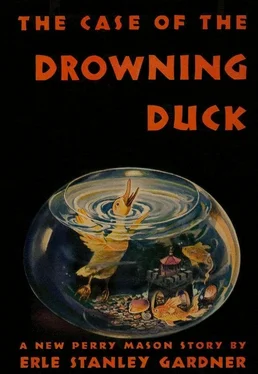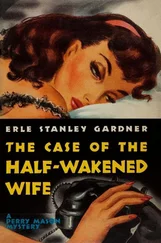The lawyer held his breath, ran to the kitchen, slammed the door shut, returned to the living room, said to the officer, “Put your head out the window. Get some fresh air.”
Haggerty nodded. Mason supported him to the window, left the officer leaning on the sill.
Moving swiftly, the lawyer dashed back, picked up the goldfish bowl, darted into the bathroom, and dumped the water down the washbowl. He turned on fresh water from the bathtub tap, until the goldfish that had been flapping around on the bottom of the bowl, began once more swimming around in the tank. When the tank was once more filled with water, Mason crossed the dining room, replaced the tank on the table. The officer was still leaning out of the window. The little duck which Mason took from his pocket was stronger now, able to move about. Mason again dried the feathers, put the duck back in the water, crossed over to the window. “How’s it coming?” he asked the officer.
“All in — got a whiff of that—”
Mason said, “We’ve got the windows open. This part of the house will air out. We’ve got to get those kitchen windows open. It’s some deadly gas. The best thing to do is to get the fire department and smash in the windows.”
“Okay... I’ll... be all right in a minute. Sort of got me for a second.”
“Just take it easy,” Mason told him.
“What is that stuff?” the officer asked. “It isn’t stove gas.”
“No, apparently some sort of chemical. How about getting downstairs?”
“There’s a man in there. We’ve got to get him out.”
“That’s a job for the fire department. Have they got gas masks?”
“Yes.”
“Well, let’s put in a call.”
Mason walked over to the telephone, called Operator, and asked the policeman, “Do you feel well enough to talk to ’em?”
The officer said, “Yes,” took the telephone, and explained the situation to the fire department. He hung up the phone, came back, and sat down by the window. “I’m feeling better now. What the devil was wrong with that duck?”
“What duck?”
“The one in the goldfish bowl?”
“Oh, you mean the one that was diving?”
“He looked damn funny,” Haggerty said. “Guess the gas got him.”
Mason motioned toward the bowl. “The one over there?”
“Yes.”
The duck was sitting on the surface of the water looking rather weak and groggy, preening his feathers.
“I guess the fresh air revived him,” Mason said.
“Uh huh. What did you want to see Milter about?”
“Oh, nothing in particular.”
“Yeah? At this hour of the night?” the officer asked skeptically.
“I heard he was out of a job. I thought I might have some work for him.”
“What’s his line?”
“He was a detective.”
“Oh... Working on something down here?”
“I don’t think so. I heard he was out of a job.”
“Where’s he been working?”
“Man by the name of Allgood in Hollywood,” Mason said. “You might ring Allgood up and find out about him.”
Sirens announced the arrival of the fire department. A fireman in a gas mask entered the kitchen, raised the windows, dragged out the inert body. Ten minutes later, a doctor pronounced that the man was stone dead, gave it as his opinion he had died of hydrocyanic poisoning.
More policemen arrived, a man from the sheriff’s office. They discovered a small water pitcher half full of liquid on the back of the gas stove.
“That’s it,” the doctor exclaimed. “Put hydrochloric acid in that pitcher, toss in a few lumps of cyanide, and you liberate a deadly gas. It’s the same kind they use to execute criminals in a gas chamber. The effect is practically instantaneous.”
“We’ll look that glass over for fingerprints,” the officer said.
Mason stretched, yawned. “Well, I guess there’s nothing more I can do to help you.”
The officer said gratefully, “You just about saved my life. If you hadn’t got those windows open and got me out of here, I’d have keeled over. Gosh, that stuff is powerful.”
“Glad to do what I could,” Mason said.
“Where are you staying down here? At the hotel?”
“No. I’m visiting a friend — a man by the name of Witherspoon who has a ranch out here...”
“Oh, yes, I know him,” the deputy sheriff said. “I get out there every once in a while for some dove or quail shooting. Will you be there for a while?”
“No, probably not longer than tomorrow. I think you’d better telephone Allgood and let him know about this man. Allgood might have some information that would help.”
“That’s a good idea,” the sheriff said,
“You could put through the call from this phone,” Mason observed. “Allgood probably has a night number where he can be reached.”
The deputy sheriff consulted for a moment with the policeman, then put through the telephone call. Mason walked over by the window and lit a cigarette. He had taken only a few puffs, when the operator, spurred on by the statement that it was a police emergency call, located Allgood in Hollywood. Mason heard the El Templo end of the conversation.
“Hello, is this Allgood?... You have a detective agency there... Uh huh. that’s right... This is the sheriff’s office at El Templo. Did you have a man working for you named Milter, Leslie L. Milter...Uh huh...He’s dead. Found dead in his room... Maybe murder. Some kind of gas... Who would have been interested in bumping him off?... Don’t know anyone, eh?... Wasn’t working on any case for you?... How long?... Why did you let him go?... Just no more work for him, eh?... How was he, a good man?... Know anything about his affairs?... How about women?... I see... Okay, let us know if you turn up anything. Just ring El Templo — either the sheriff’s office or the chief of police. Okay, g’by.”
He hung up the phone and said, “Worked for Allgood up until four or five days ago. Allgood let him go because he didn’t have any more work. Business was kinda quiet. He says Milter was a pretty good man. He can’t remember what particular cases Milter had been working on lately, but he’ll look them up and let us know. He thinks it was mostly routine stuff.”
Mason heaved a sigh of relief that Allgood hadn’t missed his cue, carefully pinched out his cigarette, dropped it in the ash tray, said, “Well, I’ll be going. If you want me for anything, you can reach me in care of Witherspoon.”
“How did you happen to be here?” the sheriff asked.
The officer said, “He drove up right behind me. I brought him in with me.”
They wished Mason good night, and, as Mason went down the stairs, he heard them moving the body of Leslie Milter.
Mason drove his car to an all-night service station, opened the trunk, pulled out the flat tire, and said, “Fix this just as soon as you can. I’ll be back in a few minutes and see how you’re coming.”
Leaving the tire in the service station, Mason walked the five blocks to the bungalow where he had been told Marvin Adams lived.
The bungalow was a simple, unpretentious stucco building. Flowers which had been planted in the yard were evidences of Mrs. Adams’ desire to beautify the place. A light was on in the front of the house. Mason rang the bell.
A studious-looking young man came to the door.
“Marvin Adams in?” Mason asked.
“No, sir, he isn’t... He took the night train to Los Angeles.”
Mason said, “He was driving a car, I believe — earlier in the evening?”
“Yes.”
“Your car?”
“Yes.”
“He had a package I gave him to deliver. Apparently he forgot to deliver it. He must have left it in his room or in the car. It’s a square package wrapped in green paper, with my name written on it. Suppose we could look in his room and see if he left it there. He might have, you know — while he was packing.”
Читать дальше












